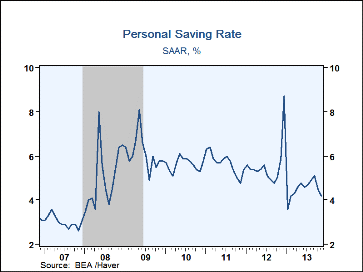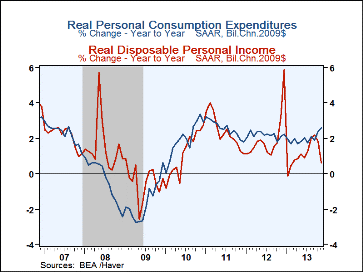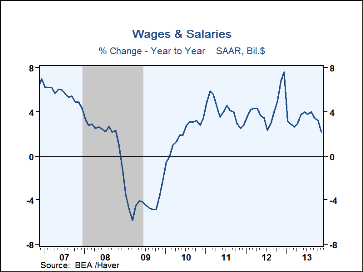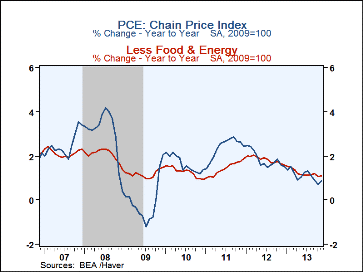 Global| Dec 23 2013
Global| Dec 23 2013U.S. Consumers Dip Into Savings to Sustain Personal Spending
by:Tom Moeller
|in:Economy in Brief
Summary
More confident individuals are dipping into savings to spend. The personal savings rate fell to 4.2% in November from a downwardly revised 4.5% in October. It was the lowest saving rate in nine months. The total amount of personal [...]
More confident individuals are dipping into savings to spend. The personal savings rate fell to 4.2% in November from a downwardly revised 4.5% in October. It was the lowest saving rate in nine months. The total amount of personal saving was down by more than one-quarter year-to-year after it spiked late in 2012.
Personal consumption expenditures rose an expected 0.5% (3.5% y/y) last month, the strongest increase since June. Motor vehicle purchases jumped 4.4% (4.4% y/y) while spending on furnishings and household equipment posted a 1.0% gain (6.5% y/y). Clothing purchases were unchanged (2.3% y/y) while lower pump prices helped gasoline expenditures fall 3.1% (-0.6% y/y). Services outlays improved 0.6% (3.4% y/y) led by a 1.3% rise (3.9% y/y) in spending on recreation services. Restaurant sales improved another 1.0% (5.4% y/y). An absence of pricing power allowed real PCE to improve 0.5% (2.6% y/y).
Personal income gained a disappointing 0.2% (2.3% y/y) after a minimal dip in October. A 0.5% November rise had been projected in the Action Economics survey. Disposable personal income increased just 0.1% (1.5% y/y), held back by a 0.8% rise (9.0% y/y) in tax payments. Wages & salaries increased 0.4% but the 2.2% year-to-year increase was the weakest since mid-2010. Rental earnings rose 0.3% (8.8% y/y) and dividend income gained 0.7% (4.0% y/y). These increases were countered by a 0.4% decline (+8.8% y/y) in proprietors' income. Also on the weak side was an unchanged level of interest earnings (1.3% y/y) and a stable level of transfer receipts (3.5% y/y). Social security payments rose 0.8% (5.6% y/y) but unemployment insurance payments declined 2.2% (-19.1% y/y).
The PCE chain price index remained unchanged in November and increased a modest 0.9% year-on-year. Less food & energy, the chain price index rose 0.1% (1.1% y/y) for a fifth straight month. Durable goods prices fell 0.3% (-2.0% y/y), led lower by a 0.5% decline (-3.1 y/y) in home furnishings prices. Recreational goods costs were off 0.3% (-5.0% y/y) while motor vehicles prices slipped 0.1% (+0.6% y/y). Nondurable goods prices fell -0.3% (-0.6% y/y) led down by a 1.5% drop (-5.5% y/y) in gasoline prices. Prices for services gained 0.2% (1.9% y/y).
The personal income & consumption figures are available in Haver's USECON and USNA databases. The consensus expectation figure is in the AS1REPNA database.
| Personal Income & Outlays (%) | Nov | Oct | Sep | Y/Y | 2012 | 2011 | 2010 |
|---|---|---|---|---|---|---|---|
| Personal Income | 0.2 | -0.1 | 0.4 | 2.3 | 4.2 | 6.1 | 2.9 |
| Wages & Salaries | 0.4 | 0.1 | 0.4 | 2.2 | 4.3 | 4.1 | 2.0 |
| Disposable Personal Income | 0.1 | -0.2 | 0.5 | 1.5 | 3.9 | 4.8 | 2.8 |
| Personal Consumption Expenditures | 0.5 | 0.4 | 0.3 | 3.5 | 4.1 | 5.0 | 3.8 |
| Personal Saving Rate | 4.2 | 4.5 | 5.1 | 5.9 (Nov'12) |
5.6 | 5.7 | 5.6 |
| PCE Chain Price Index | 0.0 | -0.0 | 0.1 | 0.9 | 1.8 | 2.4 | 1.7 |
| Less Food & Energy | 0.1 | 0.1 | 0.1 | 1.1 | 1.7 | 1.4 | 1.3 |
| Real Disposable Income | 0.1 | -0.2 | 0.4 | 0.6 | 1.7 | 2.4 | 1.1 |
| Real Personal Consumption Expenditures | 0.5 | 0.4 | 0.2 | 2.6 | 2.2 | 2.5 | 2.0 |
Tom Moeller
AuthorMore in Author Profile »Prior to joining Haver Analytics in 2000, Mr. Moeller worked as the Economist at Chancellor Capital Management from 1985 to 1999. There, he developed comprehensive economic forecasts and interpreted economic data for equity and fixed income portfolio managers. Also at Chancellor, Mr. Moeller worked as an equity analyst and was responsible for researching and rating companies in the economically sensitive automobile and housing industries for investment in Chancellor’s equity portfolio. Prior to joining Chancellor, Mr. Moeller was an Economist at Citibank from 1979 to 1984. He also analyzed pricing behavior in the metals industry for the Council on Wage and Price Stability in Washington, D.C. In 1999, Mr. Moeller received the award for most accurate forecast from the Forecasters' Club of New York. From 1990 to 1992 he was President of the New York Association for Business Economists. Mr. Moeller earned an M.B.A. in Finance from Fordham University, where he graduated in 1987. He holds a Bachelor of Arts in Economics from George Washington University.
More Economy in Brief
 Global| Feb 05 2026
Global| Feb 05 2026Charts of the Week: Balanced Policy, Resilient Data and AI Narratives
by:Andrew Cates










